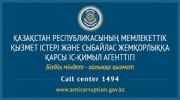- Departments by region
- Astana
- Almaty
- Ulytau Region
- Zhetysu Region
- Шымкент
- Abay region
- Akmola region
- Aktobe region
- Almaty region
- Atyrau region
- East Kazakhstan region
- Zhambyl region
- West Kazakhstan region
- Karagandy region
- Kostanay region
- Kyzylorda region
- Mangistau region
- Pavlodar region
- North Kazakhstan region
- South Kazakhstan region
Date of publication: 06.03.2024 12:34
Date of changing: 06.03.2024 12:35
The problem of corruption in various areas of activity of state authorities and management has currently acquired a global and systemic character. Corruption poses a direct threat to national security, hinders the development of institutions of democracy and civil society in our country, and obstructs citizens' realization of their constitutional rights. Additionally, corruption negatively impacts the development of the economy, as well as the financial system and the entire infrastructure of the Republic of Kazakhstan in general. All these and other issues objectively necessitate the formation by the state of effective mechanisms of anti-corruption policy.
Since the beginning of the socio-economic transformations in our country, the fight against corruption has been declared both in the system of state power as a whole and in its individual components. Combating bribery is one of the priority directions of modern criminal law policy of the state. The concept of "corruption" comes from the Latin word "corruptio," which means spoilage or bribery, and represents one of the oldest phenomena, for which there is no single formulation, as various concepts of corruption exist in scientific, educational, and journalistic literature. The World Bank's definition is often cited: "corruption is the abuse of public power for personal gain." Another definition, cited more often than others, is "corruption is the abuse of authority by a public official for personal enrichment."
The most common form of corruption is the giving and taking of bribes, as they are continuously associated with other socially dangerous consequences - causing substantial harm to the interests of the state and the authority of power, inflicting significant damage to the market economy, etc. The giving of a bribe is inseparable from its receipt. Bribery cannot occur without the giving of a bribe. Consequently, a completed bribery offense cannot occur if material values or benefits of a property nature, which are the subject of the bribe, have not been accepted by the official. Bribery is a problem that permeates all branches of government at all levels. A state permeated with corruption loses authority in the eyes of society; this phenomenon is fraught with consequences in the form of the emergence of legal nihilism in society and on a global scale, citizens lose trust in the government.
Counteracting corruption involves: preventing corruption and subsequently eliminating its causes (corruption prevention), combating corruption (identification, prevention, suppression, disclosure, and investigation of corruption offenses), minimizing and eliminating the consequences of corrupt manifestations. The goal of countering corruption is to eliminate corruption in society. All state bodies, organizations, quasi-governmental sector entities, and officials are obliged to conduct counter-corruption activities within their competence.




























